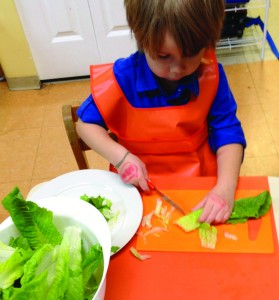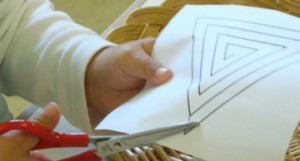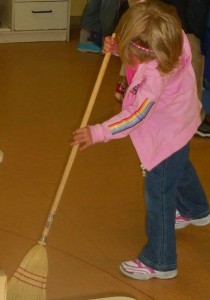In our previous posts, Introduction to Practical Life and Practical Life Materials, we stressed the importance of such exercises in our classroom environments. Children are keen observers who notice all of the mundane actions that we must do every day. Such activities as preparing food, to dressing, fixing things, and cleaning up are fascinating to young children because they have a strong drive to be independent and belong to their time and place. Young children want to be participants and not spectators! Having that in mind, your home is the perfect place for implementing Practical Life activities. We tend to give the children items such as a play-kitchen filled plastic vegetables and knives, for example, when the child is perfectly capable of helping you prepare a salad for dinner!
 However, before assuming that the child will be able to perform a task, take the time to demonstrate and teach your child how to do things things by her/himself. A careful “presentation” lets your child clearly see how to do something and the technique of use of a specific tool. Have in mind that your movements give your child a stencil to pattern his/her movements after so take the time to handle the objects with care and with respect. For example, show them the way to proper hold a broom (best if you purchase a child-sized broom!) and how to sweep crumbs on the floor or how to wipe up a spill using a sponge or a cloth. Demonstrate how to carefully remove the stem from spinach leaves and place the unwanted parts in the compost bin or how to set a table for dinner. Show them how to sort whites from colours when doing laundry and later how to fold each piece of clothing. Demonstrate how to put one’s own shoes when leaving and hang coats when arriving home. By taking the time to give a practical exhibition of a task and allow your child to perform it at his/her own time, you can help your child become a confident and capable person who contributes to the life in the home. At the same time, your child will be refining his/her fine and motor coordination and feeling a sense of pride.
However, before assuming that the child will be able to perform a task, take the time to demonstrate and teach your child how to do things things by her/himself. A careful “presentation” lets your child clearly see how to do something and the technique of use of a specific tool. Have in mind that your movements give your child a stencil to pattern his/her movements after so take the time to handle the objects with care and with respect. For example, show them the way to proper hold a broom (best if you purchase a child-sized broom!) and how to sweep crumbs on the floor or how to wipe up a spill using a sponge or a cloth. Demonstrate how to carefully remove the stem from spinach leaves and place the unwanted parts in the compost bin or how to set a table for dinner. Show them how to sort whites from colours when doing laundry and later how to fold each piece of clothing. Demonstrate how to put one’s own shoes when leaving and hang coats when arriving home. By taking the time to give a practical exhibition of a task and allow your child to perform it at his/her own time, you can help your child become a confident and capable person who contributes to the life in the home. At the same time, your child will be refining his/her fine and motor coordination and feeling a sense of pride.
Don’t forget that these activities should give your child a feeling of success. Therefore, they should present themselves as attainable challenges. They should not be too easy, as this will disengage the child, but also not to hard as this will be a motive of frustration. Be aware of your child’s own capabilities and eagerness to help. Also, make sure that you show the activity from beginning to end (including how to put things away in their proper place or replenish whatever is needed). Here are a few ideas of Practical Life activities around the home:
Using Manipulative Materials and Tools
– Opening and closing various types of containers, doors and cupboards
– Using tongs, tweezers, turkey baster, eyedroppers, syringes
– Using scissors, stickers, stamps, glue, paintbrushes, markers, play dough, crayons and other art equipment appropriately
– Handling a book
– Using a funnel
Care of Self
– Brushing teeth
– Brushing hair
– Washing face
– Blowing nose
– Dressing oneself: shirt, pants, socks, shoes, coat (buttoning, zippering, snapping)
– Putting clothes in the hamper
– Sorting laundry
– Folding clothes and socks
– Hanging clothes on a hook; hanging clothes on a hanger
Care of the Home 
– Setting a table
– Serving snacks of meals
– Folding napkins, cloths and towels
– Cooking skills (measuring, mixing, stirring, whisking, pouring, etc)
– Washing and drying dishes and utensils
– Stacking dishes and sorting utensils
– Food preparation (washing vegetables and fruits, peeling and cutting a banana or a carrot; peeling and segmenting a mandarin, shelling peas, coring an apple; buttering bread; squeezing juice, peel and slice an egg, chopping strawberries, grating cheese, spoon an avocado, prepare cereal in the morning, cracking nuts, etc)
– Cleaning (wipe spills, sweeping, mopping, dusting)
– Using a dust pan
– Washing windows and mirrors
– Making a bed
– Drawing and opening curtains and blinds
– Watering plants
– Arranging flowers in a vase
– Gardening (planting seeds, raking, pulling weeds)
– Caring for animals
Engaging in these activities on a daily basis helps to develop and refine children’s executive abilities by directing their minds and bodies towards the accomplishment of purposeful tasks. More importantly, it instills in them, the confidence that they too, are capable individuals who can contribute to their home and world in a meaningful way.
© Lions Gate Montessori
